人教版中考英语近义词辨析第十六集
人教版初中英语中考 第十六讲 九年级 Unit 1—Unit 2
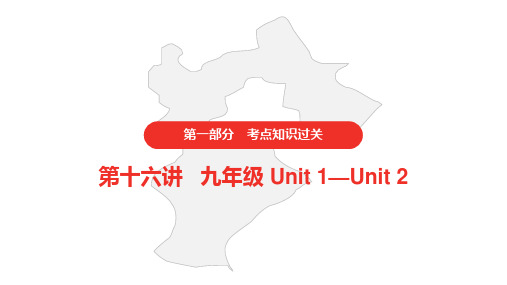
A. lies
B. notes
C. dangers
D. hobbies
用lie, lay的适当形式填空
21.A letter was ___ly_i_n_g___ on the floor when I came into the classr ___l_i_ed____ to me before, so I trust him.
考点 1 patient的用法
好题在线
1.I think Miss Wang is the most __A____ teacher in our school. She never gets angry with her students.
A. patient
B. beautiful
C. interesting
(patient).
考点 1 patient的用法
好题在线
4.The nurse won't leave her __p_a_ti_e_n_t_s_ (patient) unless she's sure they are all taken good care of.
5.Our parents spent too much time teaching us how to eat and walk when we were young, so we should be patient __w__it_h___ them when they're old.(盲填)
(2)作动词,意为"对待;看待"。常见用法: ①treat...as/like...将……当作…… ②treat sb./sth. with...以……方式对待某人/某物 She treats me like one of the family. 她把我当作家人看待。
中考英语人教版 教材系统复习 16 考点精讲十六 九年级Units 1-2 (2)

8.FranklinCC electricity,and Edison ______ the light bulb(灯泡). A.discovered;discovered B.invented;invented C.discovered;invented D.invented;discovered
14.(2019.呼和浩特)I really need to take more exercise because I'm BB weight. A.putting down B.putting on C.putting off D.putting away
15.—It's cold outside,Jimmy!You should CC your sweater. —Thanks,Mom. A.take off B.take in C.put on D.put up
考点 3 “疑问词+动词不定式”结构
(1)动词不定式前面加上疑问词 what,which,when,where,how 等(why 除外), 用在 know,tell,wonder,ask,learn,find out 等动词(短语)之后作宾语,也可直 接作句子的主语。如: He was considering what to do next.他在考虑下一步怎么办。 When to go to Beijing hasn't been decided yet.什么时候去北京还没定下 来。
考点精讲十六 九年级 Units 1-2
【教材原句】I study by working with a group.我通过小组合作来学习。 (Unit 1 P1)
初中中考英语100组近义词辨析

初中英语近义词辨析1. clothes, cloth, clothingclothes统指各种衣服,谓语动词永远是复数,cloth指布,为不可数名词clothing 服装的总称,指一件衣服用a piece of, an article of.2. family, house, homehome 家,包括住处和家人,house房子,住宅,family家庭成员. My family is a happy one.3. sound, voice, noisesound自然界各种各样的声音,voice人的嗓音,noise噪音I hate the loud noise outside.4. photo, picture, drawingphoto用照相机拍摄的照片,picture可指相片,图片,电影片,drawing画的画。
5. population, peoplepopulation人口,人数,people具体的人China has a large population.6. road, street, path, wayroad具体的公路,马路,street街道,path小路,小径,way道路,途径take this road; in the street, show me the way to the museum.7. custom, habitcustom传统风俗,习俗,也可指生活习惯,后接to do,habit生活习惯,习惯成自然,后接of doing. I've got the habit of drinking a lot.8. exercise, exercises, practiceexercise运动,锻炼(不可数),exercises练习(可数),practice(反复做的)练习Practice makes perfect.9. class, lesson作"课"解时,两者可以替换.指课文用lesson. 指班级或全体学生用class. Lesson 6; class 5.10. officer, officialofficer部队的军官,official政府官员an army officer.11. work, job二者均指工作。
中考英语近义词汇及词组辨析

中考英语近义词汇及词组辨析中考英语考试中,近义词汇及词组的辨析是一个很重要的考点。
同学们在备考过程中应该特别注意掌握这些词汇及词组的区别和用法。
本文将为大家介绍一些常见的近义词汇及词组,帮助同学们更好地应对中考英语。
一、accurate与correctaccurate和correct都表示“准确的”。
它们的区别在于:accurate强调准确度的高,而correct则更多地强调符合规范、正确的。
例如:1. The scientist made accurate measurements. (科学家做出了准确的测量。
)2. Please correct your mistakes in the essay. (请在作文中纠正你的错误。
)二、advice与adviseadvice是名词,意为“建议”或“忠告”,而advise是动词,意为“建议”或“提供意见”。
例如:1. Can you give me some advice on how to learn English? (你能给我一些建议如何学习英语吗?)2. I advise you not to be late for the meeting. (我建议你们不要迟到会议。
)三、borrow与lendborrow和lend都与“借”的概念有关,但使用上有所不同。
borrow表示“借入”,lend表示“借出”。
例如:1. Can I borrow your pen? (我能借用你的钢笔吗?)2. Could you lend me some money? (你能借给我一些钱吗?)四、famous与popularfamous和popular都表示“著名的”,但有所不同。
famous更多地指代某个人或事物在广泛的范围内被人所熟知,而popular则更多地指代某个人或事物在大众之间受欢迎。
例如:1. Mozart is a famous composer. (莫扎特是一个著名的作曲家。
中考英语人教版 教材知识盘点 16 考点精讲十六 九年级Units12

重点词 汇拓展
7.spread v.→__spprreeada_d_(过去式/过去分词)传播;展开 8.wonder v.想知道→__wwoonndedrefurlf_u_aldj. 精彩的 →__woonndderefurlfluy_l_l adv.极好地;精彩地 9.cryeate v.→crcearteativivee adj.有创造力的→crcearteivativiityy n.创造力;独创性 10.die v.→dydi yingng(现在分词)→deda eadd adj.死的→ dedateathh n.死亡
都传播爱与欢乐。
12.It's a piepieccee of of cackakee.小菜一碟。
13.It serservveess you right.你活该。
谈论如何学习
1.— HoHwodwo ydouoleyou alernarEnnglish? (你怎样学E英n语gl?ish) ? 情景交际 —I learn by studying with a group.(Unit 1 P4) 2.—Do you learn English by reading aloud?
谈论节日
4.—What have you learned about Halloween? —Oh,I know it's a popular festival in North America and 情景交际 it's on October 31st.(Unit 2 P13) 5.—What do you like most about this festival? — I thIintkhitn'skf it'usnfutondrteossdurpeassscuarptooanscchaarratcotoerns! (我认为ch打a扮ra成ct卡er通s人!物很有趣!)(Unit 2 P13)
初中中考英语近义词辨析大全共75页

初中中考英语近义词辨析大全1 a bit/ a little这两个词都意为“一点儿”有时可以互换,但有时不能。
Ⅰ.二者作程度副词修饰形容词、副词、动词或比较级时,意义相同,为“一点儿”“有些”。
如:①I am a bit / a little hungry. 我有点饿。
②He walked a bit / a little slowly. 他走路有点慢。
Ⅱ.二者都可以作名词词组,充当主语或宾语。
如:① A little / bit is enough for me. 我有一点儿就够了。
②I know only a little / a bit about her. 我对她的情况只了解一点。
Ⅲ。
a little可直接修饰名词;a bit后须加of才可以。
如:①.There is a little water in the bottle. = There is a bit of water in the bottle.[注意]a little of后的名词通常特指,表“……中的一些”,如:①May I have a little of your tea?Ⅳ. 否定形式not a little 作状语,相当于very/ quite, “很”,“非常”;作定语和宾语时,相当于much, 意为“许多”。
而not a bit 作状语时,相当于not at all, 意为“一点也不”,作宾语时则相当于not much. Eg:①He is not a little (=very) hungry. 他饿极了。
②He is not a bit (=not at all) hungry.他一点也不饿。
③She ate not a little (=much). 她吃得很多。
Ⅴ. Not a bit中的not 可以分开使用;not a littl e中的not 则不能分开。
Eg:①He felt not a bit tired. = He didn‟t feel a bit tired. 他觉得一点也不累。
人教版 中考英语近义词辨析 第十六集
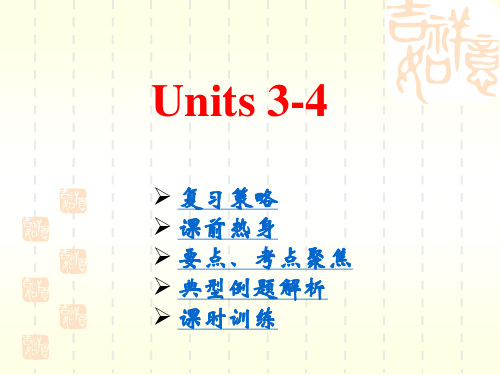
Units 3-4 复习策略课前热身要点、考点聚焦 典型例题解析 课时训练复习策略1.掌握现在完成时中延续性时间状语的用法及以“that”引导的宾语从句。
2.掌握有关环境保护及旅游方面的词汇及习惯用语。
3.熟悉有关电话用语及留言条的格式,完成有关听力训练,能运用宾语从句转述别人的陈述。
4.能运用本课时所复习的词汇撰写有关环境和旅游方面的小短文。
课前热身1.我发现这个工厂在住宅附近的河里倾倒废水。
I found that the factory was pouring waste water into the river near it. 2.商人害怕报纸和电视台。
Businessmen are afraid of newspapers and TV stations.3.你加入“绿色中国”多久了?我加入“绿色中国”组织已有一年了。
—How long have you been a member of Greener China?—I've been with Greener China for a year.4.我的朋友说外面有辆卡车在收集垃圾。
My friend said that there was a truck collecting rubbish outside.课前热身5.这是一种令人愉快的办法,有助于保持我们城市的清洁。
It's a pleasant way to help keep out city clean.6.保护环境非常重要。
Taking care of our environment is very important.7.我们的责任是保持我们的环境干净和整洁。
It's our duty to keep our environment clean and tidy.8.如果人人都为环境保护做一点贡献,世界将变得更美丽。
If everyone makes a contribution to protecting the environment,the world will become much more beautiful.9.树越多越好。
中考英语近义词辨析-小学语文基础知识归纳.doc
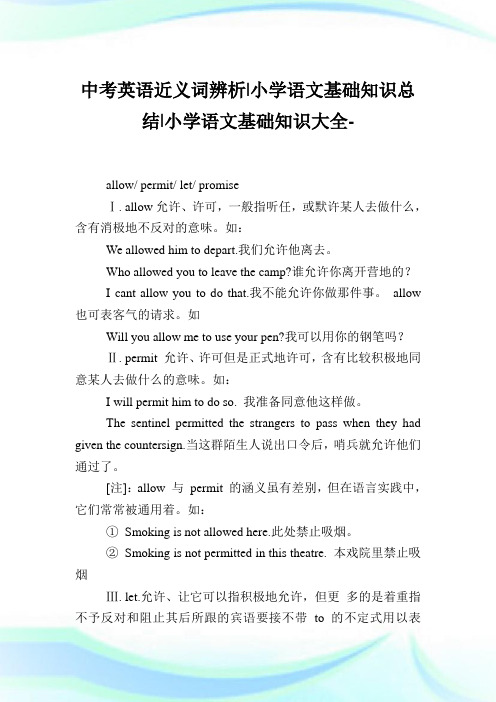
中考英语近义词辨析|小学语文基础知识总结|小学语文基础知识大全-allow/ permit/ let/ promiseⅠ. allow允许、许可,一般指听任,或默许某人去做什么,含有消极地不反对的意味。
如:We allowed him to depart.我们允许他离去。
Who allowed you to leave the camp?谁允许你离开营地的?I cant allow you to do that.我不能允许你做那件事。
allow 也可表客气的请求。
如Will you allow me to use your pen?我可以用你的钢笔吗?Ⅱ. permit 允许、许可但是正式地许可,含有比较积极地同意某人去做什么的意味。
如:I will permit him to do so. 我准备同意他这样做。
The sentinel permitted the strangers to pass when they had given the countersign.当这群陌生人说出口令后,哨兵就允许他们通过了。
[注]:allow 与permit 的涵义虽有差别,但在语言实践中,它们常常被通用着。
如:①Smoking is not allowed here.此处禁止吸烟。
②Smoking is not permitted in this theatre. 本戏院里禁止吸烟Ⅲ. let.允许、让它可以指积极地允许,但更多的是着重指不予反对和阻止其后所跟的宾语要接不带to 的不定式用以表示客气的请求时,可与allow 通用。
且更具有口语色彩。
如:Her father will not let her go.她父亲不会让她去。
Dont let this happen again. 不要让这种事发生了。
Please let me know what happens.请告诉我发生些什么事。
Ⅳ. promise 答应允诺。
中考英语同义词近义词相似词语辨析_4
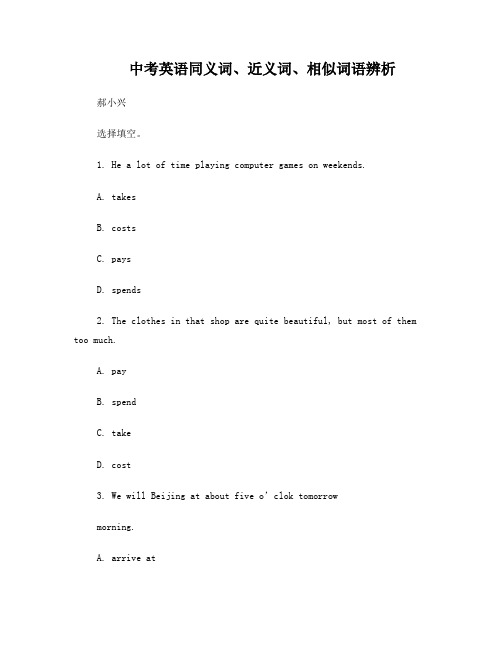
中考英语同义词、近义词、相似词语辨析郝小兴选择填空。
1. He a lot of time playing computer games on weekends.A. takesB. costsC. paysD. spends2. The clothes in that shop are quite beautiful, but most of them too much.A. payB. spendC. takeD. cost3. We will Beijing at about five o’clok tomorrowmorning.A. arrive atB. arrive inC. reach toD. get4. Today Jim his white shirt and brown trousers.A. is putting onB. is wearingC. is dressingD. in5. Is the woman yellow your teacher?A. inB. putting onC. wearingD. dressing6.—Bob, may I your MP4?—Sure. But you’d better not it to others.A. keep; lendB. lend; borrowC. borrow; keepD. borrow; lend7. Don’t forget to “Thank you” when someone opens the doo r for you.A. tellB. sayC. speakD. talk8.Our newspaper represents the of the people.A. shoutB. noiseC. voiceD. cry9. Let’s get some about tourism on the Internet.A. informationB. messageC. inventionD. book10.—Could you give me two on how to learn English well? —Sure.A. suggestionsB. messagesC. informationD. advice11. We’re busy because we have so housework to do today.A. fewB. littleC. manyD. much12. There is milk at home. We have to buy some this afternoon.A. a littleB. littleC. a fewD. few13. —I’d like grapes and pears.—Oh, I only need orange juice.A. some; a fewB. a few; someC. a little; fewD. a little; a few14. I invited Joe and Linda to dinner, but of them came.A. neitherB. eitherC. noneD. both15.—There’s coffee and tea; you can have .—Thanks.A. eitherB. eachC. oneD. it16.“Have try, you are so close to the answer,”the teacher said to Eric.A. the otherB. one anotherC. otherD. another17. My sister has two skirts. One is yellow; is black.A. otherB. anotherC. othersD. the other18. We don’t have enough nurses to look after the patients. At least are needed.A. tn another nursesB. more ten nursesC. other ten nursesD. another ten nurses19. Sam looks like his dad. They are tall.A. eitherB. anyC. allD. both20. —Which of the two T-shirts will you take?—I’ll take , one for my brother, the other for myself.A. eitherB. neitherC. allD. both21.—What the number of the students in your school? —About two thousands. A number of them from England.A. is ; areB. is ; isC. are ; isD. are ; are22. the teachers in their school is about 200 and one fourth of them are teachers.A. A number of ; womenB.A number of ; womanC. The number of ; womenD. The number of ; woman23.—Guess how much it costs?—I think it costs 15 and 20 dollars.A. fromB. betweenC. amongD.with24.—What do you often do classes to relax yourself?—Listen to music.A. overB. amongC. betweenD. through25.—The cake looks .—Yes, and it tastes even _______.A. well ; goodB.nice ; betterC. good; worseD. better; best26. I didn’t sle ep ______ last night. I feel tired now.A. wellB. niceC. fineD. good27.—_______ do you visit your grandparents?—Once a week.A. How longB. How oftenC. How soonD. How many28.—_______ will the 30th London Olympic Games be held, do you know?—In two years.A. How longB. How oftenC. How soonD.How much29.—Granny, you look so weak. What’s wrong with you? —Terrible. The factory made _______ noise. It was ______ noisy that I couldn’t sleep well last night.A. too much; soB. much too; soC. too much; tooD. too much; much too30.—Has John come _______?—Yes. He has ______ been here for 10 minutes.A. yet ; alreadyB. already ; yetC. already ; alreadyD. yet ; yet【辨析与讲解】1.spend,take,cost,paySpend的宾语通常是时间、金钱。
人教版英语中考重点词义辨析
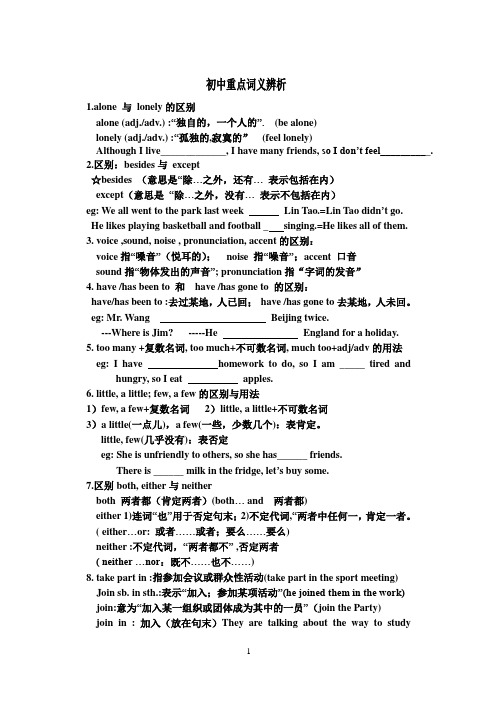
初中重点词义辨析1.alone 与lonely的区别alone (adj./adv.) :“独自的,一个人的”.(be alone)lonely (adj./adv.) :“孤独的,寂寞的”(feel lonely)Although I live_____________, I have many friends, so I don’t feel__________.2.区别:besides与except☆besides (意思是“除…之外,还有…表示包括在内)except(意思是“除…之外,没有…表示不包括在内)eg: We all went to the park last week Lin Tao.=Lin Tao didn’t go.He likes playing basketball and football _ singing.=He likes all of them.3. voice ,sound, noise , pronunciation, accent的区别:voice指“嗓音”(悦耳的);noise 指“噪音”;accent 口音sound指“物体发出的声音”; pronunciation指“字词的发音”4. have /has been to 和have /has gone to 的区别:have/has been to :去过某地,人已回;have /has gone to去某地,人未回。
eg: Mr. Wang Beijing twice.---Where is Jim? -----He England for a holiday.5. too many +复数名词, too much+不可数名词, much too+adj/adv的用法eg: I have homework to do, so I am _____ tired and hungry, so I eat apples.6. little, a little; few, a few的区别与用法1)few, a few+复数名词2)little, a little+不可数名词3)a little(一点儿),a few(一些,少数几个):表肯定。
初中英语人教版中考常考近义词归纳总结(共132组)

英语常考近义词归纳总结1.快乐“假期”(1)vacation n.假期;度假(2)holiday n.假期;假日(3)leave n.假期;休假(4)break n.短期休假;间歇2.各种“方法”(1)way n.方法;方式(2)means n.方式;方法(3)approach n.方法;途径(4)method n.方法3.表示人生各个阶段的名词汇总(1)newborn (出生28天以内的)婴儿(2)baby 婴儿(3)infant 幼儿(4)toddler 刚学会走路的孩子(5)children (10岁以下的)(6)teenager 青少年(13-19)(7)youth 青年(8)youngster 年轻人(9)adult 成年人(10)elder 长者4. “承认;认可”汇总(1)admit vt.承认;准许……进入/加入(2)recognize vt.承认;(正式)认可(3)acknowledge vt.承认(4)approve vt.批准;认可(5)confess vt.承认;坦白5. “感谢”家庭(1)thank v.感谢(2)thankful adj.感激的(3)grateful adj.感激的(4)gratitude n.感激(5)appreciate vt.感激(6)appreciation n.感激6.“事情”荟萃(1)thing n.单一的事情(2)event n.重要事情;大事(3)incident n.不平常的事件(4)matter n.事情;情况(5)accident n.事故;意外事件(6)affair n. 事情7.“害怕”百态(1)afraid adj.害怕的;恐惧的(2)fearful adj.担心的;害怕的(3)frightened adj.受惊的;害怕的(4)scared adj.害怕的(5)terrified adj.非常害怕的;极度惊恐的8.“v.+-er”表示主动者;“v.+-ee”表示被动者(1)examiner n.考官;主考人examinee n.应试者(2)employer n.雇主employee n.雇员(3)trainer n.教练员trainee n.受训者(4)interviewer n.面试者;主考官interviewee n.被面试者9.变b/be为p再加-tion构成名词(1)absorb→absorption 吸收(2)describe→description 描述(3)subscribe→subscription 订阅(4)prescribe→prescription 处方10.“盼望;期望;渴望”聚焦(1)look forward to盼望(2)be anxious/eager for 渴望(3)be dying for/to do...想要……(4)long for/to do...渴望……(5)be thirsty/hungry for 渴望11.注意下列短语中不同的介词(1)be similar to和……相似(2)be the same as和……一样(3)be different from和……不同(4)be identical to 和......相同12.立刻;马上(1)right away/now(2)at once(3)in no time(4)immediately(5)straight away13.喜爱;喜欢(1)care for(2)go in for(3)fall in love with(4)lose one’s heart to14.总览表示“物质存在形式”的词(1)gas n.气体(2)liquid n.液体(3)solid n.固体15.“电”家族集会(1)electric adj.用电的;带电的(2)electrical adj.与电有关的(3)electricity n.电;电流(4)electronic adj.电子的16.大“气”全接触(1)oxygen n.氧气(2)hydrogen n.氢气(3)carbon dioxide n.二氧化碳(4)nitrogen n.氮气(5)atmosphere n.大气层17.事实上;实际上(1)as a matter of fact(2)in fact(3)in effect(4)in reality(5)actually18.掌握“常见疾病”(1)cold n.感冒(2)cough n.咳嗽(3)flu n.流感(4)fever n.发烧19.“后加-ache”名词小结(1)headache头疼(2)toothache牙疼(3)backache背疼(4)stomachache胃疼20.盘点“身体部位名词用作动词”的单词(1)head v.朝……方向前进(2)face v.面对(3)eye v.注视;观看(4)hand v.传递(5)arm v.武装;装备(6)back v.支持;后退(7)shoulder v.肩负21.常见的“以-ly结尾的形容词”小结(1)lively活泼的(2)likely可能的(3)lovely可爱的(4)lonely孤独的(5)friendly友好的22.“v.+ant”名词全接触(1)assist→assistant助手(2)account→accountant会计(3)inhabit→inhabitant居民(4)participate→participant 参与者(5)serve→servant仆人23.“着迷”短语万花筒(1)be/get/become addicted to对……上瘾;沉迷于……(2)be crazy about 迷恋;热衷于……(3)abandon oneself to 沉湎于……(4)be keen on对……着迷(5)be obsessed with 对……着迷24.除了(1)apart from(2)besides(3)as well as(4)in addition to(5)but(6)except25.“加后缀-ician”名词集结(1)musician 音乐家(2)physician 内科医生(3)politician 政治家(4)technician 技术员(5)electrician 电工26.“无进行、无被动”短语汇总(1)belong to属于(2)take place发生(3)consist of由……构成(4)break out爆发(5)come about发生(6)break down出故障27.既可表示单数也可表示复数的集合名词(1)audience 观众(2)family 家庭;家人(3)team 队伍(4)class 班级(5)committee 委员会28.“go+adj.”短语汇总(1)go bad变质(2)go wrong出毛病(3)go deaf变聋(4)go blind失明(5)go mad变疯29.因为;由于(1)as a result of(2)as a consequence of(3)in consequence of(4)because of(5)owing to(6)due to(7)on account of(8)thanks to30.各种“忍受”(1)stand v.容忍(2)bear v.忍受;承担(3)tolerate v.容忍;容许(4)endure v.忍耐;忍受(5)put up with容忍;忍受31.“-ity名词”荟萃(1)reality现实(2)equality平等(3)popularity流行;普及(4)security安全32.名词后加-tic构成形容词(1)drama→dramatic 戏剧性的(2)reality→realistic现实主义的(3)energy→energetic精力充沛的(4)fantasy→fantastic极好的;美妙的33.保护(1)protect(2)shelter(3)preserve(4)conserve(5)defend(保卫)34.阻止......做某事(1)keep...from...(2)stop...from...(3)prevent...from...(4)ban...from...(5)forbid...from...(forbid...to do sth更常用)35.“太空”相关词汇集合(1)alien n.外星人(2)universe n.宇宙(3)spaceship n.宇宙飞船(4)spaceman n.太空人;宇航员(5)astronaut n.宇航员(6)cosmonaut n.宇航员(俄罗斯)(7)capsule n.太空舱(8)orbit n.轨道36.“总共;总计”短语汇总(1)in all总共;总计(2)in total总共;总计(3)add up to加起来总共(4)sum up 计算……的总数37.盘点“很高兴做某事”(1)be delighted to do sth(2)be glad to do sth(3)be happy to do sth(4)be pleased to do sth(5)have fun doing sth38. “地理”词汇大集合(1)ocean n.海洋(2)island n.岛屿(3)plain n.平原(4)continent n.大陆;大洲(5)plateau n.高原39.“表情”单词集锦(1)look n.面部表情;外貌(2)face n.脸;表情(3)expression n.表情(4)appearance n.外表40.不同“位置”(1)place n.地方;场所;位置(2)site n.场所;地方;遗址(3)position n.位置;方位(4)location n.场所;地点;位置(5)situation n.位置;形势;局面41.发生(vi. 不被动)(1)happen(2)take place(3)occur(4)come about(How did it come about that...)(5)break out(战争、疾病等爆发)42.突然想到......(1)It occurs/occurred to sb that...(2)It hits/hit sb that...(3)It strikes/struck sb that...(4)It comes/came to sb that...(5)It crowds/crowded in on sb that...(6)It flashes/flashed into sb that...43.“v.+sb+of sth”短语:cure sb of sth 治好某人的病accuse sb of sth 指控某人某事warn sb of sth 警告某人某事inform sb of sth 通知某人某事convince sb of sth 使某人相信某事rob sb of sth 抢劫某人某物suspect sb of sth 怀疑某人某事ease/rid sb of sth 使某人摆脱某事persuade sb of sth 使某人信服cheat sb of sth 骗走某人某物44.带介词to的短语:look forward to期待;期望;期盼be used / accustomed to 习惯于be addicted to 沉溺于stick to 坚持belong to 属于add to 增加devote...to 献身于;致力于adapt to 适应object to 反对=be opposed torefer to 谈到get down to 开始做lead to 导致contribute to 有助于turn to 求助于;转向keep to 遵守45.条条大“路”(1)highway n.公路(2)railway n.铁路(3)railroad n.铁路(4)freeway n.高速公路(5)expressway n.高速公路46.“名词+-y变为形容词”高频词汇扫描(1)cloud→cloudy 多云的(2)wealth→wealthy 富裕的(3)health→healthy 健康的(4)thirst→thirsty 渴的(5)anger→angry 生气的(6)hunger→hungry 饥饿的47.“收入”面面观(1)income n.收入(2)pay n.报酬(3)salary n.(按月发的)薪水(4)wage n.(按周领的)工资(5)pension n.养老金;退休金48.“地质灾害”汇总(1)earthquake n.地震(2)flood n.洪水(3)drought n.干旱(4)tsunami n.海啸(5)landslide n.滑坡49.“气象灾害”集合(1)storm n.暴风雨(2)snowstorm n.暴风雪(3)thunderstorm n.雷暴(4)tornado n.龙卷风(5)hurricane n.飓风50.“打”得各式各样(1)hit v.打击;袭击(2)beat v.敲击;打败(3)tap v.轻敲;轻拍;轻打(4)knock v.敲;打;敲击(5)strike v.敲击;打击51.“积极”与“不积极”(1)active adj.积极的;主动的→passive adj.被动的;消极的(2)positive adj.积极的;肯定的→negative adj.消极的;否定的(3)optimistic adj.乐观的;积极的→pessimistic adj.悲观的;厌世的52.1.“前缀fore-”常见词一览(1)foresee v.预见;预知(2)forecast v.& n.预测;预报(3)foretell v.预言;预示(4)forehead n.前额(5)foreground n.(图画或照片的)前景53.“后缀-th”高频名词集锦(1)warmth 温暖(2)depth 深度(3)length 长度(4)strength 力量;力气(5)faith 信念;信仰54.“努力做某事”汇总(1)try/do one’s best to do sth(2)do what sb can to do sth(3)make efforts/every effort to do sth(4)go all out to do sth55.“在某人看来”的多种表达(1)in one’s opinion(2)in one’s view(3)from one’s point of view(4)as for sb(5)as far as sb be concerned56.靠......为生(1)exist on(2)survive on(3)live on(4)feed on57.“对……有影响”短语集合(1)have an effect on(2)have an influence on(3)have an impact on58.“简言之”大团圆(1)in a/one word(2)all in all(3)in short/brief(4)to be brief/short(5)in a nutshell“总之”(1)in conclusion(2)all in all(3)on the whole(4)to sum up59.“被困住”家庭(1)be/get caught in(2)be/get stuck in(3)be/get trapped in60.“看”过来(1)see v.看到;看见(2)look v.看(3)watch v.观看;注视(4)notice v.注意到(5)observe v.观察61.位于;坐落于(可根据后面所接宾语选择适当的介词,如in、on等)(1)lie in(2)stand in(3)be located in(4)be situated in62. have a +n.+of...结构(1)have a population of ... 有......人口(2)have a history of... 有......历史(3)have an area of...有......面积(4)have a distance of...有.....距离63.导致(1)cause(2)result in(3)contribute to(4)bring about64.“允许;禁止”相关词汇荟萃(1)allow v.允许(2)permit v.允许;许可(3)forbid v.禁止(4)ban v.禁止(5)prohibit v.禁止65.“提供;给予”常见词一览(1)give v.给予+sb. sth/sth to sb(2)offer v.主动提供+sb sth/sth to sb(3)provide v.提供+sb with sth/sth for sb(4)supply v.供应+sth to sb/sb with sth 66.厌烦;厌倦(1)be bored with(2)be fed up with(3)be tired of(4)be sick of67.确信(1)be sure of sth/that...(2)be confident of sth/that...(3)be certain of sth/that...(4)be convinced of sth/that...68.“证书”家族(1)permit n.许可证(2)license n.许可证;执照(licence)(3)certificate n.证明书(4)diploma n.文凭;毕业证书69.各种“费用”(1)fee n.费用;服务费;酬金;会费(2)cost n.价钱;成本;费用(3)expense n.花费;费用(4)charge n.费用;价钱(5)fare n.车费;船费;飞机票价70.使某人/某事......(1)make/let ...do/done(2)have...do/done/doing(3)get...to do/done/doing71. “静”系列(1)calm adj.平静的;冷静的(2)cool adj.冷静的(3)quiet adj.安静的(4)still adj.静止的(5)silent adj.沉默的72.“动词加-ence变为名词”大聚会(1)exist→existence存在(2)refer→reference参考(3)differ→difference不同(4)prefer→preference偏好73.表示“(做)……的方法”的短语:the approach to (doing) sththe way to do / of doing sththe means of doing sththe method of doing sth表示“以这种方法”的短语:in the wayby the meanswith the method74.“帝王”家族(1)emperor n.皇帝(2)empress n.皇后(3)king n.国王(4)queen n.王后(5)prince n.王子;亲王(6)princess n.公主;王妃75.各种“可能”(1)likely adj.可能的(2)possible adj.可能的(3)probable adj.很可能的(4)unlikely adj.不可能的(5)impossible adj.不可能的76.“后缀-ify”动词小结(1)simplify 简化(2)identify 确定;识别(3)beautify 美化(4)purify 净化(5)terrify 使害怕(6)clarify 澄清;阐明77.“-ist”表示“……家”词汇搜索(1)artist n.艺术家(2)scientist n.科学家(3)pianist n.钢琴家(4)violinist n.小提琴家(5)physicist n.物理学家(6)linguist n.语言学家(7) socialist n.社会主义者(8)chemist n.化学家;药剂师(9)biologist n.生物学家(10)economist n.经济学家(11)geologist n.地质学家(12)journalist n.记者;新闻工作者(13)psychologist n. 心理学家78.推迟(1)put off(2)delay(3)postpone79.“后缀-ial”高频形容词扫描(1)facial 面部的(2)official 官方的;正式的(3)beneficial 有利的;有益的(4)essential 必不可少的(5)financial 财政的;金融的80.“满意的”一览(1)pleasing adj.令人满意的(2)pleased adj.高兴的;满意的(3)satisfying adj.令人满意的(4)satisfied adj.满意的(5)satisfactory adj.令人满意的(6)content adj.满意的;满足的81.“人员”集合(1)worker n.工人(2)staff n.全体职员;员工(3)employee n.雇员;雇工(4)clerk n.职员;办事员(5)personnel n.人事部门;职员82.“in+n.+to”短语(1)in response to作为……的回应(2)in reply to对……回复(3)in addition to除……之外(4)in regard to关于;对于(5)in contrast to与……相比83.“发明创造”大全(1)make vt.制造(2)invent vt.发明(3)create vt.创造(4)manufacture vt.生产;制造(5)design vt.设计84.“惊恐”一览(1)frighten vt.使惊恐(n. fright)(2)terrify vt.使恐惧(n. terror)(3)panic vt.恐慌(p. panicked)(4)scare vt.&n.惊吓(adj. scared;scary)(5)shock vt.&n.使震惊85.“雨”词汇串联(1)pour vi.(雨)倾盆而下(2)rainfall n.降雨量(3)rainstorm n.暴风雨(4)acid rain n.酸雨86.“一......就......”结构(1) as soon as(2)hardly/barely/scarcely/rarely...when...; no sooner....than...(3)instantly; immediately; directly(4)the moment; the minute; the second; the instant(5)on+n/doing87.显著的;非凡的(1)remarkable(2)extraordinary88.显而易见的(1)clear(2)obvious(3)apparent(4)evident89.各种“预订”(1)book vt.预订(2)order vt.订购(3)reserve vt.预订;预留(4)reservation n.预订;预留90.“运送”词汇大集合(1)transport vt.运输;运送(2)convey vt.传达;运送;输送(3)deliver vt.投递;递送(4)ship vt.(用船)运送91.“走”来“走”去(1)walk v.散步;步行(2)wander vi.漫步;闲逛(3)crawl v.爬行;匍匐前进(4)rush v.冲;闯(5)march v.行军;前进92.“扩张;扩大”词汇扫描(1)extend v.延长(2)expand v.扩大;扩展(3)enlarge v.扩大(4)broaden v.变宽93.“体育”相关词汇全接触(1)athletics n.田径运动(2)stadium n.体育场(3)track n.跑道(4)tracksuit n.运动服(5)trainer n.运动鞋;教练员(6)sportswear n.运动服(7)gymnast n.体操运动员(8)champion n.冠军(9)gym n. 体育馆94.“球类”集合(1)basketball n.篮球(2)football n.足球(soccer)(3)baseball n.棒球(4)table tennis n.乒乓球运动(5)rugby n.橄榄球运动(6)volleyball n. 排球(7)tennis n. 网球(8)badminton n. 羽毛球95.life短语一览(1)all one’s life一生;终生(2)lead/live a...life 过着……的生活(3)bring...to life 使…苏醒;使…生动起来(4)come to life 复活;复苏;变得活跃(5)give one’s life to 为……献身96.“将......视为......”结构(1)regard...as...(2)think of...as...(3)consider...as....(4)look on ...as...97. “肯定的”汇聚(1)sure adj.确定的;肯定的(2)certain adj.肯定的;确定无疑的(3)positive adj.积极的;肯定的(4)definite adj.肯定的(5)guaranteed adj.有保证的98. lead短语聚会(1)lead to通向;导致(2)take the lead带头;领先(3)in the lead处于领先地位(4)lead the way带路;领路(5)lead sb by the nose牵着某人的鼻子走99.“in+n.”短语集结(1)in addition除此之外;另外(2)in conclusion 总之;最后(3)in danger处于危险中(4)in peace平静地(5)in power当权100.加前缀in-变为反义词的形容词(1)correct→incorrect(2)direct→indirect(3)formal→informal(4)capable→incapable(5)visible→invisible101.“出现;消失”家族(1)appear v.出现;露面(2)disappear v.消失(3)vanish v.消失(4)fade v.褪色;逐渐消失102.“责备;表扬”相关词汇大观园(1)blame v.& n.责备(2)scold v.责备;申斥(3)criticize v.批评;指责(4)praise v.表扬;赞扬(5)compliment n.恭维;赞美103.raise形近词集锦(1)rise vi.上升;起立(2)arise vi.出现;上升(3)rouse vt.唤醒;激发(4)arouse vt.引起;唤醒;激发104.term短语万花筒(1)in terms of在……方面(2)in the long term长期而言(3)in the short term短期而言(4)(be) on good terms with与……关系好(5)(be) on bad terms with与……关系不好105.“be+过去分词 +prep.”高频短语(1)be tired of厌烦……(2)be faced with面临;面对(3)be connected with与……有关(4)be involved in卷入;涉及(5)be combined with 与……相结合106.“缩小”万花筒(1)reduce v.缩小;减少(2)reduction n.缩小;减少(3)decrease v.降低;使减少(4)shrink v.(使)缩小;(使)收缩107.“处理”全接触(1)deal v.处理;对待(2)handle v.应付;处理(3)treat v.处理;治疗(4)conduct v.进行;处理(5)manage v.设法完成;处理108.“美德”相关词汇一览(1)virtue n.美德(2)faith n.忠诚(3)justice n.正义(4)bravery n.英勇(5)diligence n.勤奋109.suspect形近词大丰收(1)suspect v.怀疑(2)inspect v.视察;检查(3)respect v.& n.尊敬;尊重(4)aspect n.方面110.变“-t”为“-ce”成名词的词全扫描(1)important→importance 重要(2)different→difference 不同(3)confident→confidence 信心(4)distant→distance 距离(5)elegant→elegance 优雅(6)patient→patience 耐心(7)diligent→diligence 勤奋111.“选择”种种(1)choose v.选择(2)choice n.选择(3)select v.挑选;选拔(4)pick v.挑选;采摘(5)elect v.推选;选择;选举(6)election n.推选;选择;选举112.盘点后缀-ship高频词(1)friendship n.友谊(2)hardship n.苦难(3)partnership n.伙伴关系(4)ownership n.所有权(5)scholarship n.奖学金113.“获得”大聚会(1)get v.获得;得到(2)gain v.& n.获得;得到(3)obtain v.获得;得到(4)acquire v.获得;得到(5)attain v.获得;达到114.由able所想到的(1)able adj.有能力的(2)ability n.能力(3)enable v.使能够(4)disable v.使丧失能力(5)capable adj.有能力的;能胜任的115.if necessary 相似短语小结(1)if necessary 如果必要的话(2)if possible 如果可能(3)if any 如果有(4)if ever 如果曾经有过(5)if so 如果是这样(6)if not 不然;要不116.history短语小聚(1)in history 在历史上(2)in the history of 在……的历史上(3)make history 载入史册117.“后缀-ous”高频形容词一览(1)famous 出名的(2)dangerous 危险的(3)humorous 幽默的(4)courageous 勇敢的(5)generous 慷慨的(6)ambiguous 模糊不清的118.学会“适应”(1)fit v.使适应;安装(2)suit v.适合;使适应(3)adjust v.调整;使适应(4)adapt v.使适应;改编(5)accommodate v.(使)适应;容纳119.“后缀-ity”名词汇总(1)minority 少数(2)majority 多数(3)equality 平等;相等(4)identity 身份;同一性(5)gravity 重力;地心引力120.fool相关词汇扫描(1)foolish adj.傻的(2)stupid adj.愚蠢的(3)silly adj.傻的(4)idiot n.白痴121.全面“保护”(1)protect v.保护;防护(2)protection n.保护;防护(3)preserve v.保护;保存(4)defend v.辩护;防护;保卫(5)defence n.辩护;防护;保卫(6)guard v.保卫;监视122.to为介词的短语汇总(1)contribute to导致;有助于(2)object to 反对(3)lead to 导致(4)refer to 参考;指(5)stick to 坚持123.try短语万花筒(1)try out 尝试(2)try to do 努力做(3)try doing 试着做(4)try one’s best 尽某人最大努力(5)try sth on 试穿124.后缀“-ent”高频词一览(1)different 不同的(2)dependent 依靠的;依赖的(3)existent 存在的(4)absorbent 易吸收的(5)consistent 一致的;始终如一的125.“主要的”一览(1)main adj. 主要的;怕最重要的(2)major adj. 主要的;主修的(3)chief adj. 主要的;首席的(4)leading adj. 领导的;主要的(5)primary adj. 主要的;初级的126.“丰富”大会(1)rich adj. 富有的;丰富的(2)abundant adj. 丰富的;充裕的(3)ample adj. 丰富的;足够的(4)full adj. 满的;丰富的127.“前缀trans-”高频词全接触(1)transform v. 转变;改变(2)transfer n. 转让;转移(3)translate v. 翻译(4)transport v.&n.运输;运送(5)transparent adj. 透明的128.种种“反对”(1)oppose v. 反对(2)opposed adj. 反对的(3)against prep. 反对;违反(4)object v. 反对;不赞成(5)disapprove v. 不赞成129.“悲伤”家族(1)sad adj. 悲伤的;难过的(2)sadness n. 悲哀;难过(3)sorrow n. 悲伤;悲痛(4)sorrowful adj. 悲伤的(5)grief n. 悲痛;忧伤130.“控告”词汇一览(1)accuse v. 指控;控告(sb. of...)(2)charge v. 指控(sb. with...)(3)complain v. 抱怨;控诉(about...)(4)sue v. 控告;请求131.“揭露与隐藏”相关词汇(1)hide v. 隐藏(2)mask v. 掩饰;戴面具(3)discover v. 发现(4)uncover v. 揭露;发现(5)expose v. 使暴露;接发(6)reveal v. 揭示;揭露132.“大量的”高频短语(1)a good/great/huge number of+pl.(2)a great/good many+pl.(3)a great deal of +un.(4)a large amount of +un.(5)a large quantity of+un./pl.(6)plenty of +un./pl.。
人教版九年级英语同义词辨析高频错题分析练习题50题【含答案解析】

人教版九年级英语同义词辨析高频错题分析练习题50题【含答案解析】1. The little girl is so ______ that she can answer all the questions correctly.A. smartB. cleverC. intelligent答案:A。
解析:这三个词都有聪明的意思。
“smart”更强调头脑灵活、反应快,在课本例句中多用来形容小女孩快速回答问题这种情况。
“clever”侧重于表示机灵、巧妙,常指在解决问题上有独特的办法。
“intelligent”更多表示有智慧、理解力强,通常用于形容有较高智力水平的人或事物。
这里形容小女孩能正确回答所有问题,反应快,用“smart”更合适。
2. We should ______ the old traditions.A. keepB. preserveC. reserve答案:B。
解析:“keep”有保持、保留的意思,强调持续的状态。
“preserve”侧重于保护、保存,有使某物维持原状、避免受损的意思,这里说保护传统,用“preserve”更准确。
“reserve”主要表示预订、预留,与传统的保护意思不同。
3. He ______ a lot of money for his son's education.A. savedB. spared答案:A。
解析:“saved”指储蓄、积攒,为了某个目的而存钱,这里为儿子的教育存钱,符合“saved”的用法。
“spared”表示抽出、匀出,如抽出时间等。
“reserved”表示预订或者保留,通常是预订座位、保留意见等,和存钱的意思不同。
4. The movie is very ______, and many people like it.A. interestingB. interestedC. interest答案:A。
解析:“interesting”是令人感兴趣的,用来形容事物本身有趣,这里电影是事物,所以用“interesting”。
中考英语近义词辨析
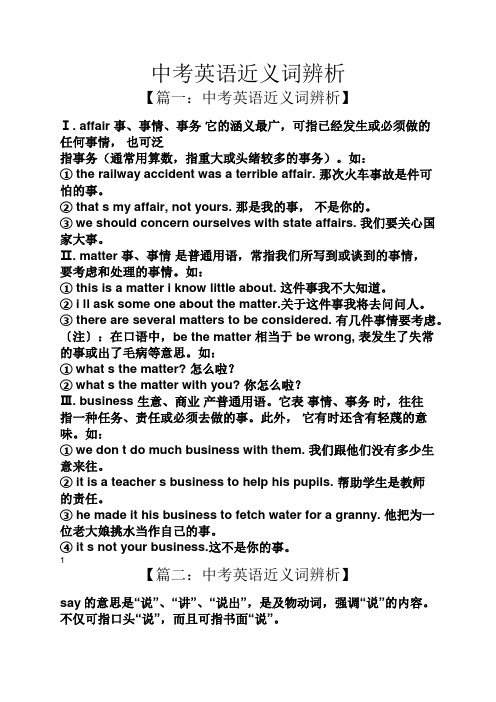
中考英语近义词辨析【篇一:中考英语近义词辨析】Ⅰ. affair 事、事情、事务它的涵义最广,可指已经发生或必须做的任何事情,也可泛指事务(通常用算数,指重大或头绪较多的事务)。
如:① the railway accident was a terrible affair. 那次火车事故是件可怕的事。
② that s my affair, not yours. 那是我的事,不是你的。
③ we should concern ourselves with state affairs. 我们要关心国家大事。
Ⅱ. matter 事、事情是普通用语,常指我们所写到或谈到的事情,要考虑和处理的事情。
如:① this is a matter i know little about. 这件事我不大知道。
② i ll ask some one about the matter.关于这件事我将去问问人。
③ there are several matters to be considered. 有几件事情要考虑。
〔注〕:在口语中,be the matter 相当于 be wrong, 表发生了失常的事或出了毛病等意思。
如:① what s the matter? 怎么啦?② what s the matter with you? 你怎么啦?Ⅲ. business 生意、商业产普通用语。
它表事情、事务时,往往指一种任务、责任或必须去做的事。
此外,它有时还含有轻蔑的意味。
如:① we don t do much business with them. 我们跟他们没有多少生意来往。
② it is a teacher s business to help his pupils. 帮助学生是教师的责任。
③ he made it his business to fetch water for a granny. 他把为一位老大娘挑水当作自己的事。
最新中考英语人教版考点知识拓展:第16讲九年级Units3-4
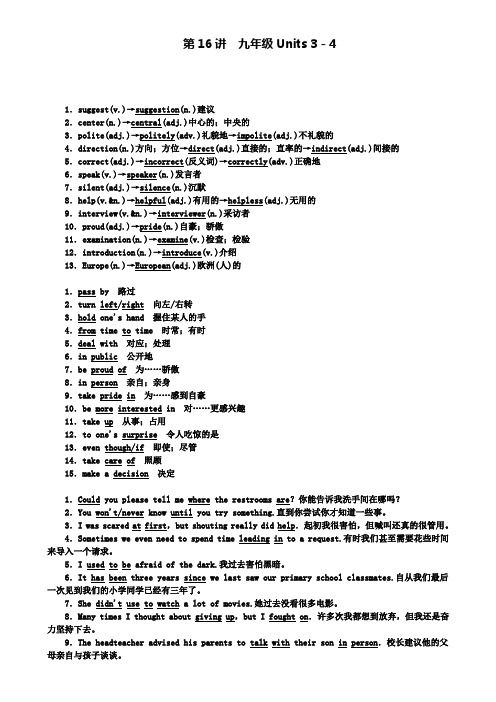
第16讲九年级Units 3-41.suggest(v.)→suggestion(n.)建议2.center(n.)→central(adj.)中心的;中央的3.polite(adj.)→politely(adv.)礼貌地→impolite(adj.)不礼貌的4.direction(n.)方向;方位→direct(adj.)直接的;直率的→indirect(adj.)间接的5.correct(adj.)→incorrect(反义词)→correctly(adv.)正确地6.speak(v.)→speaker(n.)发言者7.silent(adj.)→silence(n.)沉默8.help(v.&n.)→helpful(adj.)有用的→helpless(adj.)无用的9.interview(v.&n.)→interviewer(n.)采访者10.proud(adj.)→pride(n.)自豪;骄傲11.examination(n.)→examine(v.)检查;检验12.introduction(n.)→introduce(v.)介绍13.Europe(n.)→European(adj.)欧洲(人)的1.pass by 路过2.turn left/right 向左/右转3.hold one's hand 握住某人的手4.from time to time 时常;有时5.deal with 对应;处理6.in public 公开地7.be proud of 为……骄傲8.in person 亲自;亲身9.take pride in 为……感到自豪10.be more interested in 对……更感兴趣11.take up 从事;占用12.to one's surprise 令人吃惊的是13.even though/if 即使;尽管14.take care of 照顾15.make a decision 决定1.Could you please tell me where the restrooms are?你能告诉我洗手间在哪吗?2.You won't/never know until you try something.直到你尝试你才知道一些事。
- 1、下载文档前请自行甄别文档内容的完整性,平台不提供额外的编辑、内容补充、找答案等附加服务。
- 2、"仅部分预览"的文档,不可在线预览部分如存在完整性等问题,可反馈申请退款(可完整预览的文档不适用该条件!)。
- 3、如文档侵犯您的权益,请联系客服反馈,我们会尽快为您处理(人工客服工作时间:9:00-18:30)。
Units 3-4➢复习策略➢课前热身➢要点、考点聚焦➢典型例题解析➢课时训练➢复习策略1.掌握现在完成时中延续性时间状语的用法及以“that”引导的宾语从句。
2.掌握有关环境保护及旅游方面的词汇及习惯用语。
3.熟悉有关电话用语及留言条的格式,完成有关听力训练,能运用宾语从句转述别人的陈述。
4.能运用本课时所复习的词汇撰写有关环境和旅游方面的小短文。
➢课前热身1.I found that the factory was pouring waste water into the river near it.2.Businessmen are afraid of newspapers and TV stations.3.你加入“绿色中国”多久了?—How long have you been a member of Greener China?—I've been with Greener China for a year.4.My friend said that there was a truck collecting rubbish outside.➢课前热身5.这是一种令人愉快的办法,有助于保持我们城市的清洁。
It's a pleasant way to help keep out city clean.6.Taking care of our environment is very important.7.It's our duty to keep our environment clean and tidy.8.如果人人都为环境保护做一点贡献,世界将变得更美丽。
If everyone makes a contribution to protecting the environment,the world will become much more beautiful. 9.The more trees,the better.10.I hope to see him as soon as possible.11.He says that he won't be free until tomorrow.12.It is much cheaper and far more enjoyable than a rushed trip by air.13.They kept watching the beautiful scenery out of the window.14.A young man practised speaking English with Mr Green.15.快点!Hurry up! Or we'll be late.16.你认为最快的旅游方式是什么?—What do you think is the fastest way to travel?—I think the fastest say to travel is by place.17.Most people get sick because of the cold weather.how long 对段时间提问,常用提问“for+“since+过去时间/“It takes sb.some time to do sth.”中的“some time”提问how manyhow muchhow often 对频率如“sometimes,often,always usually ,never ,once a week"how soon 对“in+how for 2.1.pour...into... 把……倒入……例句:Pour sugar out of a bag into a pot.例句:She was enjoying a piece of beautiful musicwhen I came in.harm the environment protect the environmentimprove the environment 改善环境5.as soon as 一……就,引导的从句为时间状语从句。
当主句是一般将来时态时。
从句通常用一般现在时,与其用法相同的词还有when ,until ,after ,before ,while 等。
另外还有“if"“unless"引导的条件状语从句,也遵循主句为一般将来时、从句为34.a piece of music 一首音乐,music 为不可数名词。
6.keep a diarykeep +宾+形容词(形容词作宾语补定语),使维持(某种状态)keep doing keep sb. doing sth.keep on doing sth.=go on doing sth.keep sb./sth. from doing sth.阻止……干某事7.in a public place in public 公开地,当众地8.cut down 砍倒,砍伐。
down 是副词,宾语若是代词,须放于中间。
如:Don't cut it down.阻止……干某事keep...from,doing sth.prevent...from,doing sth.stop...from,doing sth....11.the+比较级,the +比较级,“越……,就越……”例句:The more trees,the betterThe busier my mother is ,the happier she feels.9.It's our duty to do sth.“我们的责任是干某事”或“干某事是我们的责任。
”句中的it 为形式主语,真正的主语为后面的动词不定式。
动词不定式作主语放在句首,显得太长。
为避免头重脚轻,常用It is...to 句型。
如:It is important to learn English well.10.make a contribution to sth./doing sth.为某事或做某事贡献一份力量。
其中to是介词,接动词时一定要用“-ing”的形式。
如:We should make a contribution to building our country.do well in sth./doing sth.在……方面干得出色be good at 12.13.jointake part in 指参加会议或群众性活动等。
例句:Did you take part in the meeting yesterday?When did you join the party?sth.doing sth.擅长于。
二短语可互换。
联想do badly in 在……be weak /poor 在……弱(差劲)right now=at the momentright away=at once just now 刚才,与一般过去时连用,“just"14.make sure be sure of sth.+宾语从句表示“务必”、“确保”、“弄确实of /about sth.+to do sth.表示“确信、一定”的意思。
15.litter about=throw about 意为“乱扔”。
其中about 是副词,宾语若是代词,要放在中间。
16.17.“as+形容词或副词的原级+as possible"=“as+形容词或副词的原级+as one can"尽可能……as soon possibleas early as possibleas fast/quickly asexcept/but 除了(后面的宾语不包括在内)besides 除了……还(后面的宾语包括在内)between...and.../between the two...among 在三者及三者以上之间18.I'm free every day except today.除以今天以外我每天都有空。
(今天没空)The all went to the zoo besides Jim.除了吉姆之外,他们也都去了动物园。
(吉姆也去了)。
19.20.go to somewhere by air /plane /on a plane=fly to go to somewhere by bike=ride to somewherego to somewhere on foot=walk to somewhereenjoyable more enjoyable the most enjoyable expensive=dear —more expensive —the most expensive comfortable —more comfortable —the most comfortable21.lively 热闹的,形容词,一般“-ly”结构词为副词。
但以“ly”结尾的词为形容词的还有“lovely 可爱的”,“friendly 友好的”。
I don't know how I could She's a lovely girl.她是个可爱的女孩。
The Chinese people are very friendly.The street is very lively on Sundays.星期天街上很热闹。
22.23.practise doing sth.练习干某事practise 后面的动词需用“-ing"形式。
offer sb. sth.=offer sth. to sb.offer to do sth.(主动)go to bed 上床睡觉。
其对应词语是“get up"go to sleep=get to sleepfall asleep 睡着,侧重于“自然而然睡着”,其对应词语为“wake up"be asleep 熟睡的,强调进入睡眠的状态,其对应词语为“be awake"seem to do sth.It seems that+主=主seem(s) to do sth. 252624例句:It seems that she is ill=She seems to be ill.27last longlast yearthe last one➢要点、考点聚焦show sb.sth.=show sth. to sb.把……出示给……give sb.sth.=give sth. to sb.把……pass sb. sth.=pass sth. to sb.把……30take photos=take picturestake medicine=have medicinetake a bus/a taxi 乘公共汽车/出租车28 go on a trip=have a tripenjoy oneself have a good timeplay happilyhave a lot of fun312932most expensive way to travelleast expensive way to travel 最便宜的旅游方式➢要点、考点聚焦例句:I have had the bag for two days.这个包我买两天了33.瞬间动词不能与延续性时间状语连用,若与之连用,则瞬间动词应换为延续性动词。
